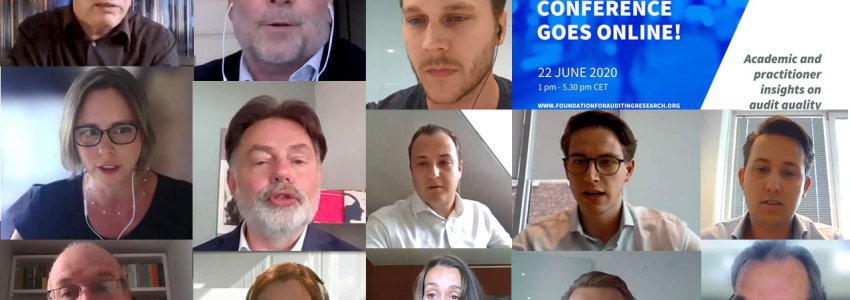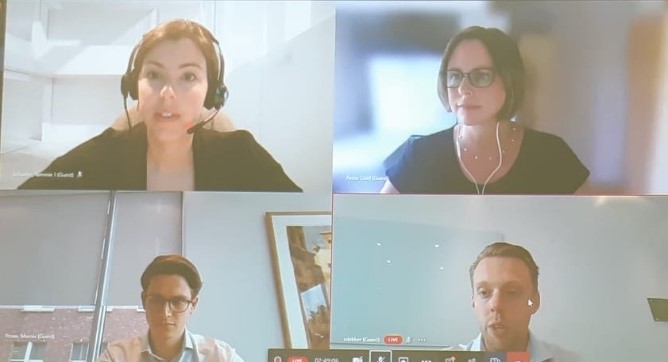FAR Online Conference 22 June 2020 - summary and videos
29 June 2020

2020 Conference Foundation for Auditing Research: ‘Issuing Going Concern Opinions Resembles COVID-19 approach’
The yearly International FAR Conference was held on Monday June 22. Given the unprecedented circumstances, the event took place in an online, Corona-proof setting. Still nearly 200 participants from all over the world registered for this virtual meeting. About 50 percent were academics and the other 50 percent consisted of, for example, practitioners, regulators and government officials. The theme of the conference was purposefully broad: ‘academic and practitioner insights on audit quality’. This theme seamlessly fits with FAR’s main purpose: facilitating knowledge development and knowledge dissemination concerning audit quality.
The presentations provided a representative cross section of the current FAR projects, in which knowledge is created as well as shared. During five sessions, researchers from Canada, the Netherlands, Switzerland and the USA presented their FAR research findings and their views on current issues.
Take-aways:
- Researchers and accountants must work on creating strong sustainable partnerships, based on mutual knowledge exchange and shared goals.
- Indirect support from the audit committee leads to more professional skepticism of the accountant.
- The issuing of a Going Concern Opinion by the accountant is similar to taking measures during the COVID-19 crisis: there is high uncertainty.
- The joint audit does not (yet) have a proven positive impact on audit quality and market concentration.
Let auditors from practice actively think along
Educational researcher Wim Gijselaers (Maastricht University) investigated the relationship between the human capital of audit firms and audit quality, particularly through the learning behavior of audit teams. That learning behavior is being influenced on different levels: at the organizational level, at the team level and at the individual level. The team learning angle offers valuable opportunities, in addition to investments in, for example, technology and external inspections. An analysis of the existing research at the organizational level shows that particularly organizational culture and working conditions have an effect on team learning behavior. These factors are under direct organizational control. ‘That is good news’, says Gijselaers.

At the team level, team composition is only of conditionally importance for success. Using interviews, Gijselaers and his colleagues examined which leadership behavior is required for a team to function properly. So-called ‘constructive conflict’ (exchanging and discussing different opinions) and regularly reflecting on what is happening and what the consequences are going to be (‘reflexivity’), are most often mentioned as being essential ingredients for an effective team. This especially holds for teams under time pressure. At the individual level, questionnaire results indicate, among other things, that younger auditors experience more directive leader behavior as a stimulus for their learning behaviors. Gijselaers: ‘The old adage applies here: the less experienced, the greater the need for structure’. The leadership style also seems to be more important than the personality traits of the leader.
Gijselaers closed with an advice for the community of researchers of auditors. According to him, it is important that researchers and auditors invest in a sound sustainable relationship. This way, each other's ‘languages’ will be better understood and it will enable a focus on common goals. This can be done, for example, by having auditors actively participate in the development of research questions.
For the presentation slides click here.
For the full video of the presentation click here.
Indirect support from the audit committee helps the auditor
Anna Gold (VU University Amsterdam) and Tammie Schaefer (University of Missouri) discussed the preliminary results of their survey and experiment concerning the support of audit committees and its effect on auditor’s skepticism.

The survey showed that most responding auditors experience support from the audit committee on more than half of their engagements. However, lower level audit staff does not directly interact with audit committees. The experimental results show that audit committee support can be effectively communicated to the audit team via the audit partner, leading to more skeptical action (but not judgment). This indirect communication via the partner is not only more effective, but also less costly than direct communication between the audit committee and the teams (given the geographical spread of the team members).
For the presentation slides click here.
For the full video of the presentation click here.
Dutch prime minister Mark Rutte and going concern opinions
The keynote speech by Marshall Geiger (University of Richmond) was very topical. He discussed going concern opinions in the context of the COVID-19 era. Geiger presented an impressive 7-slide timeline with the pandemic events and their economic impact. Our current period has been named the biggest peace time recession in almost 100 years. In that regard, it is remarkably positive that audit standards and regulations on going concern appear to be very robust. This doesn’t make the current COVID-19-guidance superfluous, but it does indicate that going concern regulation is sound.
Geiger presented his favorite quotes from the discourse on the pandemic. These are quotes made by Mark Rutte, the Dutch prime minister, during a press conference on the pandemic: ‘All decisions have been made with the scientific insights available at that moment.’ ... ‘In crises like this, you have to make 100 percent of the decisions with 50 percent of the knowledge, and bear the consequences.’ According to Geiger, this description is identical to the issues that auditors are facing in case of going-concern uncertainties: it is impossible to always make correct judgments. This provides food for thought.
For the presentation slides click here.
For the full video of the presentation click here.
A weakness doesn’t automatically imply errors
Jean Bédard (Laval University) presented a literature study on the relationship between internal control (over financial reporting) and the quality of financial reporting. That relationship is important because the auditor can make use of the client's internal control system when planning the audit. The project team examined which factors influence the internal control quality of an organization, how this subsequently affects the work of the auditor (and the judgments regarding the internal control quality) and ultimately, among other things, the quality of the financial reporting and market responses.
Previous research has shown that the quality of internal controls is positively linked to, for example, the independence and expertise of the audit committee. Bédard further emphasized that labeling limited control as an ‘internal control weakness’ does not necessarily lead to errors in the financial reporting. At the same time, not reporting weaknesses also does not mean that errors will not occur. Prior research shows that if a material weakness is reported, for example, the quality of financial reporting and the efficiency of investments will be lower. Also, the audit fees will be higher in the case of reported material weaknesses, since the auditor will have to do more work. Moreover, auditing has a positive effect on finding and reporting material weaknesses by clients.
For the presentation slides click here.
For the full video of the presentation click here.
The joint audit does not (yet) offer clear benefits
Alain Schatt (University of Lausanne) conducted a literature study on the use of a joint audit, particularly in France. The use of joint audits has recently been brought up again in the Netherlands, as a result of the publication of the 2018 AFM report Kwetsbaarheden in de structuur van de accountancysector ('Vulnerabilities in the structure of the accountancy sector'). Schatt elaborated on the potential economic consequences of the joint audit in terms of market concentration, audit costs and audit quality. As also concluded in the AFM report, the current approach to the joint audit in France is not working as desired. In practice, the joint auditors simply divide the audit work and the smaller parties perform the easiest part.
‘Voluntary audits actually don’t exist’, says Schatt. This makes sense, he thinks, since overall, audit research hasn’t found evidence that joint audits have a positive effect on audit quality. For example, in Denmark the audit quality didn’t decrease after the joint audits were abandoned. Hence, Schatt concludes that there are no clear benefits of a joint audit, in the current applications. For example, joint audits don’t change the market concentration and audit fees in the expected direction. The big firms still serve the major part of the market. However, according to Schatt, probably you simply need large offices to control large companies. Further research should show whether and how the joint audit model could contribute. That is also a recommendation in the recent report of the Commissie toekomst accountancysector (‘Committee on the future of the accountancysector’).
For the presentation slides click here.
For the full video of the presentation click here.
Follow-up Podcasts
As far as technology allowed, there was a lively feed of participant questions, led by young auditors from practice. Not all questions were covered during the sessions, due to time constraints. These questions will be answered by the presenters in follow-up podcasts which will be available shortly via our YouTube channel, click here.
The (interim) research reports of all project teams can also be found on the website.
